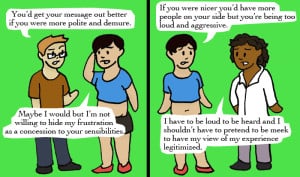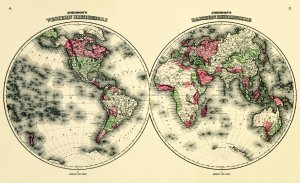
Source: Michele Price
“A misplaced fear of blaming the victim has made it somehow unacceptable to warn inexperienced young women that when they get wasted, they are putting themselves in potential peril.”
So spoke Emily Yoffe, aka Dear Prudence, in a Slate column last week recently titled College Women: Stop Getting Drunk.
Blessedly, feminists and other critics of rape culture rose up in force to counter Yoffe’s blatant victim-blaming.
Still, others wondered: “Why can’t we tell young women how to keep themselves safer?”
Why can’t we?
We can’t because for decades, survivors have been attacked, blamed, and shamed with questions and comments like, “What did you expect? You were drunk.”
Because: “What was she wearing?”
Because: “It takes two to tango.”
Because: “You know she sleeps around.”
Because: “What was she doing going there at that time?”
“She was asking for it.”
“She led him on.”
“She didn’t fight back.”
Because: The infamous “Stop dressing like a slut” (which kicked off the SlutWalk movement).
Because: The most recent, horrifying, “I’m not saying she deserved to be raped, but…what did she expect to happen at 1 a.m. after sneaking out?”
Because that is the current narrative, the cultural lens.
That is how survivor stories are told – that they are not survivors of the horrendous violation committed against them, but rather that they’re lucky to have made it out alive because – well – what did they expect? Clearly they brought it on themselves.
Thanks to the ubiquity of rape culture reflected in the beliefs listed there, you can’t go around saying to women “Don’t get drunk” without being part of the victim-blaming chorus, despite Yoffe‘s protests that she isn’t.
But while we wait around for good, feminist men to dismantle the patriarchy, there ought to be something we can do.
So is it possible to help women be safer without engaging in victim blaming? I think so.
I teach skills for stopping harassment, abuse, and assault. I, and other feminist self-defense teachers around the country, focus on increasing women’s options, not decreasing them.
Here’s what we’ve learned about helping women and members of other oppressed groups claim their power:
1. Get Real About Risks
Share information that can help women make choices.
Information is just that: Information, not a prescription.
“Alcohol is a factor in more than 50% of all rapes, and anecdotally, in an even higher percentage of rapes on university campuses” is information.
“Limit yourself to no more than two drinks, sipped slowly – no shots! – and stay away from that notorious punch bowl,” to paraphrase Yoffe’s advice to her daughter, is a prescription.
I also find it helpful to let students know that the vast majority of sexual assaults are by someone the victim knows. The take-away there is that you can worry less in parking lots and that you might want to think more carefully about who you hang out with.
I’m also clear that weapons are used infrequently. As such, resistance is more likely to be successful than you imagine.
And in almost half of muggings, the attacker is armed, so the safest thing to do is to give up your property.
I don’t say, “You have to give up your property.” I don’t even say, “You should give up your property.”
I say, “Here’s some information that can help you decide what to do if you ever face a robber.”
Information is power.
If you know where the risks lie, statistically, it can help you make smart decisions.
2. Abandon ‘Shoulds’
Don’t tell people what to do or what not to do.
“Shoulds” (“no shots!”) are disempowering.
And for those students who have already survived something (from child abuse to harassment at work to sexual assault or an abusive relationship – which accounts for about a third of all women), “shoulds” offer nothing more than another message that they should blame themselves for what happened to them.
Telling a woman not to drink is paternalistic (Mommy knows what’s best for you!) and of limited practical use.
But building her repertoire of skills? That helps a woman take charge of her life and her safety.
3. Build Skills
By equipping students with skills and strategies to deal with uncomfortable, intrusive, or dangerous, situations – by adding tools to their toolboxes – self-defense training helps them claim more of their own power.
Those tools take many forms. We practice prevention and avoidance, yelling, assertive boundary-setting, getting help, and mad strikes for when things get physical.
When put into action, the skills themselves can be life changing.
But more important is that women carry the skills with them, whether they use them or not, and they – and only they – can decide which tool to pull out of the toolbox and try in any given situation.
Also important is that there are many tools in the self-defense toolbox, so if one doesn’t work, they can pull out another.
—
That is how we help women help themselves. That is what we offer in lieu of advice.
Not “Avoid getting raped,” but rather, “The harasser, abuser, or attacker is always responsible. If you are the target of one of them, here are some things you can try.”
So no, Prudence, you don’t get to tell women to “Stop getting drunk.”
Sexual assault is about power – the assailant’s power and the victim’s powerlessness.
Let’s not make women more powerless in our attempts to help them be safer.
Want to discuss this further? Login to our online forum and start a post! If you’re not already registered as a forum user, please register first here.
Lauren R. Taylor is a Guest Writer for Everyday Feminism and teaches skills for stopping harassment, abuse, and assault with Defend Yourself. She started working to end gender-based violence in 1978 and somehow she’s still passionate and inspired. She also, in partnership with Collective Action for Safe Spaces, addresses the connection between alcohol and sexual aggression with the bystander training program Safe Bars. She loves her hometown of Washington, DC, and a vision of a better world. Her colleagues Katy Mattingly and Shenandoah Sowash contributed to this piece.
Search our 3000+ articles!
Read our articles about:
Our online racial justice training
Used by hundreds of universities, non-profits, and businesses.
Click to learn more




















